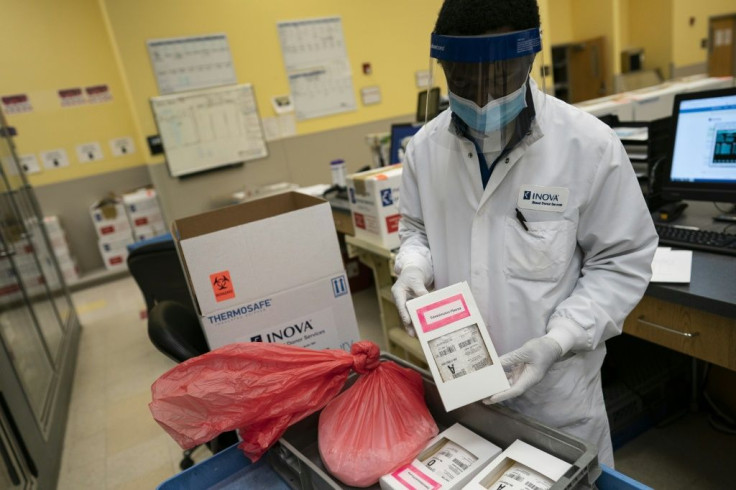When Researchers Discover A COVID-19 Cure, Credit Should Go To Robust IP Laws, Say Former Czech PM

KEY POINTS
- We need a vaccine and new treatments to help save lives and lessen the severity of the disease -- and fast.
- IP rights are already generating a flurry of research into COVID-19 vaccines and therapies in the United States.
- If European nations want to rejuvenate research and gain ground to its competitors, they must start by reducing regulatory delays, which often prevent companies from introducing newly developed drugs to the market for several years.
When my nation, the Czech Republic, reported its first case of COVID-19, the government moved swiftly to contain the disease, declaring a state of emergency and requiring all citizens wear masks and take other protective measures.
But these preventative efforts will only work for so long. Nearly 20,000 of my countrymen have been infected by the virus thus far. We need a vaccine and new treatments to help save lives and lessen the severity of the disease -- and fast.
Patients in the Czech Republic -- and around the world -- are looking to research scientists to spearhead this innovative endeavor. Thanks to robust intellectual property protections that incentivize research and development, the United States is the most likely source of COVID-19 vaccines and treatments. It's unfortunate that European countries don't prioritize biopharmaceutical innovation with the same fervor.
Drug development is one of the world's most arduous ventures. The process originates in the lab with just a basic scientific research discovery. If the compound proves medically promising, the innovator files for a patent and the long pathway to clinical development commences.
Fewer than two in every 10,000 newly synthesized compounds ever make it to patients. Accounting for these failures, turning those rare scientific discoveries into marketable products typically requires over a decade and 2 billion USD.
Intellectual property protections make such high-risk biopharmaceutical innovation possible. Patents and market exclusivity periods prevent rival firms from taking advantage of proprietary clinical data and manufacturing copycat products. This provides innovators a sense of security to pursue risky projects without unfair competition.
IP rights are already generating a flurry of research into COVID-19 vaccines and therapies in the United States. Three U.S. biotech firms -- Moderna in Massachusetts, Novavax in Maryland, and Inovio Pharmaceuticals in Pennsylvania -- have already begun human trials for potential vaccines. Gilead Sciences' investigational antiviral drug, remdesivir, has already undergone multiple clinical tests. Meanwhile, other U.S. firms, like Vaxart and Johnson & Johnson, are gearing up to test their vaccine candidates in humans later this summer.
U.S. biotech firms quickly launched these research projects thanks to the country's robust IP laws and market-based pricing schemes. For instance, the United States grants biopharmaceutical companies 12 years of data exclusivity for certain sophisticated new drugs. And it values those drugs fairly, without government price controls, creating the necessary conditions to take bold risks to research and innovate.
The United States currently receives 75 percent of the world's medical venture capital. And biopharmaceutical companies invest roughly $100 billion in U.S. research and development each year. As a result, the United States currently leads the world in biopharmaceutical innovation, developing nearly two-thirds of all new drugs. At this moment, there are over 4,500 potential treatments in development by U.S. researchers.
But America wasn't always a biopharmaceutical powerhouse. In the 1970s, it was Europe that led the world in drug development, producing over half of all medicines worldwide. Then, most European governments gradually began to adopt strict price control measures, leading to a deterioration of the innovative ecosystem. Today, Europe produces merely a third of new medicines. As a result of Europe's lackluster IP protections, more than one-third of the European biotech firms pursuing COVID-19 therapy research have partnered with a U.S. firm to do so.
Currently, the EU Commission is assessing its framework for medicine and plan to publish an EU Pharmaceutical Strategy later this year. While it has the potential to improve aspects of the existing regulatory framework, any legislative proposal could also weaken the very policies needed for Europe to compete globally, support the next generation treatments the world needs to address the current pandemic and prepare for future health crises.
If European nations want to rejuvenate research and gain ground to its competitors, they must start by reducing regulatory delays, which often prevent companies from introducing newly developed drugs to the market for several years. Such postponements effectively shave time off innovators' patents, thus diminishing their ability to earn back their investments. The EU should also promote strong IP protection and offer incentives to spur innovation. And finally, members states could abandon the price controls that artificially devalue medicines and make Europe a hostile environment for researchers.
It's only a matter of time before researchers deliver vaccines and treatments for COVID-19. But there's no reason Europeans have to be so dependent on Americans for novel medicine. We too could have a far more productive research sector and quicker access if we simply adopted America's proven IP protections and eliminated red tape.
Jan Fischer is the former Prime Minister of the Czech Republic.
© Copyright IBTimes 2025. All rights reserved.





















